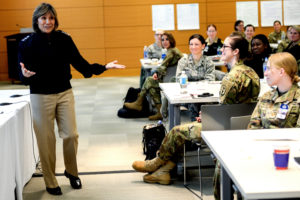Replacing Retirees Hampered by Lower Salaries

Navy Vice Admiral Raquel Bono, DHA director, addresses attendees of the Female Physician Leadership Course during a presentation this past. Military Health Service photo
WASHINGTON—Oversight agencies are sounding the alarm that VA is plagued with large staffing shortages in critical areas, including physicians, registered nurses, physician assistants, psychologists and physical therapists, as well as human resource specialists.
This shortage, and the barriers that stand in the way of VA hiring and retaining employees, could become increasingly problematic in the next few years as more employees become eligible for retirement, according to the warnings.
According to a March 2019 Government Accountability Office report, about 30% of VA employees who were on board as of Sept. 30, 2017, will hit retirement age by 2022. That same report notes that lack of effective succession planning will hamper VA’s ability to develop a pool of potential staff to meet the organization’s mission over the long term.
Similar difficulties have been spotlighted by VA’s Office of the Inspector General, which has developed a report on VA hiring every year since 2015. The 2018 report was the first to break down needs on a facility by facility basis. A review of the 140 VA medical centers found that 138 were experiencing shortages in medical professionals, with psychiatry and primary care at the top of the lists. Of those 140, 108 also reported nursing shortages. Among nonclinical positions, HR specialists and police were most often cited.
Michael Missal, VA’s inspector general, told legislators at a hearing last month to expect similar results with its 2019 staffing report, which is expected to be released this month.
“The facility-specific results underscored how different the clinical and nonclinical needs are from one facility to another,” Missal told the House VA Committee. “We have consistently recommended that VA develop and implement a staffing model that identifies and prioritizes staffing needs at the national level while allowing flexibility at the facility level.”
Such a plan butts against the perennial hiring challenges reported by VA medical directors, however. The three most frequently cited are: a lack of qualified applicants, noncompetitive salaries and high staff turnover.
Continue Reading: Lower Compensation


It’s not always about the money. Other things that can be an enticement are longer shifts with a shorter work week with appropriate annual leave compensation. This doesn’t cost the VA anything and it existed for Emergency Medicine physicians until this last quarter. We suddenly switched to an hourly leave status, lost our usual annual “shift based” leave and a third of everything that we had already accrued vanished overnight. In what industry can you take away leave that has already been promised to you! Lower pay and the fact that you can’t trust your employer means poor retention.
Hospitalists working compressed tours experienced the same as Dr. Walter. Salaries have not kept pace with the private sector. The “theoretical” salary range for Hospitalists increased about 3 yrs ago but implementation never occurred for any Hospitalist that I know. Now as already discussed by Dr. Walter, there is a loss of time already earned with no advance notice so that doctors could use the time. These recent actions will further facilitate the exit of physicians and hamper recruitment. Morale is at an all time low but yet the demands on physicians continue to increase, with physicians told that they don’t do enough for the “institution”.
Having 30 years in medicine and the last ten at the VA, I can say that recruitment begins with retention. Almost all health care workers have had some time at a VA as part of their training, and executives should worry that these folks are not interested in VA employment. Trainee physicians can see where their trainer physicians are happy. By and large, It’s not at the VA. I would also tell executive that my own retirement will be ten years earlier than I had originally planned. Much of my day is consumed with clerical and administrative tasks which make it harder for me to take care of the patients–the whole reason I went through the ordeal of medical practice. I am now on my third and last VA. Local leadership at the two previous sites made sure that they had good numbers by abusing and pressuring clinical staff, and turnover was horrid–as bad as 50% in 18 months in primary care. Larger VA does nothing about turnover; apparently it is not seen as a problem.
If the VA wants to attract and retain physicians, leadership needs to stop tasking clinical staff with administrative and clerical tasks which give us less time to be with the patients (FYI, I just got some email about CONCUR, which is a case in point). Virtual scribes are available from Jafra, and probably elsewhere, as are real human medical scribes. Clerks can be hired for clerical tasks. Leadership should also read articles on physician “burnout” by Peter Yellowlees, MBBS, MD.
The VA needs to be very concerned about this. 60% of VA physicians are 55 or older, and 60% of psychiatrists nationwide are also 55 or older. We are working on exit strategies.
As an additional concern, I would point out that 60% of VA physicians are 55 or older, and 60% of psychiatrists nationally are also 55 or older. We are looking at exit strategies, and the VA has to start looking like a better use of our time than retirement.